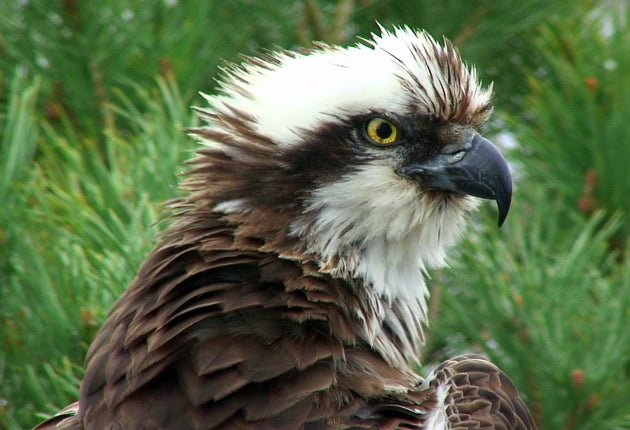The many happy returns of the world's oldest osprey
Record-breaking bird completes 3,000-mile flight from Africa to Scotland – for 20th time

She's the Grand Old Lady of the Loch – a female osprey who has now returned for a record 20th consecutive year to her Scottish nesting site.
The bird has again completed the 3,000-mile migration from her wintering grounds in West Africa to her summer breeding territory at Loch of the Lowes in Perthshire, confounding wildlife experts in the process.
At the ripe old age of 25 years old, she has lived more than three times the average lifespan of an osprey. The fish hawks began breeding again in Scotland in the 1950s after being driven to near extinction.
The bird is thought to be the oldest breeding female of her kind ever recorded in the UK. Ospreys' lives are often cut short by one of the numerous hazards they face on their long migrations to and from West Africa. The total distance she has travelling during her yearly migrations could have taken her more than half way to the Moon.
"We are truly amazed at the tenacity and endurance of this particular female osprey," said Emma Rawling, Perthshire ranger of the Scottish Wildlife Trust. "Defying her age, she has made it back to us again, and from initial sightings she looks like she is in remarkably good condition. She is now waiting for her mate to arrive to begin her 20th breeding season."
Over the years, Ms Rawling said, this one bird has laid 55 eggs, 46 of which hatched into chicks which have now left the nest. "She is a hardy old bird, that's for sure, and I can't wait to watch her progress over the next few months," she said.
The osprey was spotted landing on her usual tree-top nesting site, known as an eyrie, at 2pm on Tuesday. It is expected that her regular breeding partner, a male osprey identified with a green leg ring, will arrive within a week. This resident male will then chase away any other interloping males before initiating the breeding process.
"Usually after mating, we would expect the female to lay between two to four eggs in early April, and six weeks later the eggs should hatch," Ms Rawling said. "However, as a very old bird, her fertility is now in doubt. We will be watching the nest with bated breath to see if our female can hatch any chicks again this year."
Once the first egg is laid, Scottish Wildlife Trust staff, aided by nearly 70 volunteers, will stage a round-the-clock watch to safeguard the ospreys and their eggs from threats including thieves and poachers who steal unhatched eggs for private collections.
Using a camera hidden in the bird's nest, live footage of the events within will be aired over the course of the season, both in the Loch of the Lowes visitor centre, near Dunkeld on Tayside, and on the Scottish Wildlife Trust website.
"More than 20,000 visitors come to Loch of the Lowes each year to enjoy watching the osprey, and our high definition nest camera makes viewing the action a far more exciting and intimate experience," said Peter Ferns, the visitor centre manager.
Once a common sight in Britain, the osprey was all but extinct by 1916 because of persecution. After receiving a renewed foothold in the Scottish Highlands in the 1950s, the species has slowly spread back across Scotland and there are now an estimated 200 breeding pairs. In recent years, ospreys have also recolonised England and Wales.
High life: The Old Lady of the Loch
6,000 miles
Distance travelled by the Old Lady of the Loch every year during her migration. She has flown an estimated 150,000 miles in her lifetime.
25 years
The bird's probable age.
55 eggs
The number of eggs she has laid, 46 of which have hatched.
Subscribe to Independent Premium to bookmark this article
Want to bookmark your favourite articles and stories to read or reference later? Start your Independent Premium subscription today.

Join our commenting forum
Join thought-provoking conversations, follow other Independent readers and see their replies